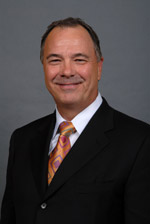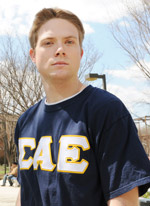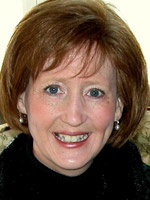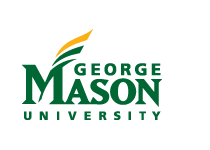So Much to Celebrate
Each spring, the George Mason University Alumni Association recognizes and honors outstanding alumni, students, and faculty members for their achievements and contributions to the university. This year’s Celebration of Distinction was held on April 30, 2009.
To learn more about all the award recipients, a pdf copy of the program is available here.
 John Paul (J. P.) Phaup
John Paul (J. P.) Phaup
Alumnus of the Year
John Paul (J. P.) Phaup, MBA ’91, is managing director, investments, at Phaup Brown Wealth Management Group of Wachovia Securities. He also is an adjunct professor in the School of Management and an instructor in the Continuing Professional Education Program. Previously, Phaup was a political consultant and campaign business manager and cofounded a software firm that developed microsystems for campaign efforts. He has been an enthusiastic supporter and actively involved with Mason for more than 17 years.
Phaup began his volunteer work as a member of the School of Management Special Work List. He served as a higher education bond volunteer and joined the Alumni Board in 1992. In 1993, he became the founder of the MBA Alumni Chapter, serving as its first president. A President’s Circle Society member, he has given generously of his personal time. Phaup’s passion for the performing arts has led to his involvement with the College of Visual and Performing Arts, where he serves as vice chair of the Arts at Mason Partnership Board and chair of the Instruments in the Attic campaign. In addition, Phaup is a current member of the George Mason University Foundation Board of Trustees and serves on the Alumni Action Steering Committee.
Phaup and his work on the Instruments in the Attic program was profiled in the Spring 2009 Mason Spirit.
Jeffery M. Johnson
Alumni Service Award
Jeffery M. Johnson, BS Business Administration ’75, left public accounting as an auditor to enter the insurance business in 1976. Today, he is a principal and president of Johnson & Strachan Inc., a full service, multi-line, commercial, and personal insurance agency. This year Johnson and his firm established the Johnson & Strachan Speakers Series within the School of Management (SOM) at Mason. Among the speakers the series brought to campus was Newt Gingrich, former speaker of the U.S. House of Representatives. “By establishing the speakers series,” writes Alison O’Brien, associate dean for undergraduate program at SOM, “Jeff is essentially contributing to the intellectual capacity of the region and to our efforts to enhance the reputation of the school and the university.”
A former chair of Mason’s Annual Fund, Johnson has served on the board of directors and as president of the George Mason University Alumni Association. He was also on the alumni committee for the university’s first comprehensive campaign.
For several years, he has been involved with Five Talents International, a Christian microfinance organization that offers people the opportunity to lift themselves out of poverty by providing access to basic savings and microcredit services built on their trusted community traditions. Johnson has served as chair of the Five Talents annual golf outing fundraiser. He has been to the Philippines three times on Business as Mission trips. On these trips, he has taught a basic business curriculum that includes accounting, marketing, and writing a basic business plan. A member of the Church of the Holy Comforter in Vienna, Virginia, he also volunteers his time to a number of church committees.
Johnson and his work with Five Talents was featured in the Fall 2005 Mason Spirit.
 Peter Boettke
Peter Boettke
Faculty Member of the Year
If there were an MVP award in academia, Mason economist and alumnus Peter J. Boettke would surely win the honor if his colleagues and students had a say. Instead, they honored him by nominating him for Faculty Member of the Year. Boettke received the award in April at the annual Celebration of Distinction by the George Mason University Alumni Association, which sponsors the award.
An avid basketball fan and long-time youth basketball coach, Boettke is known for his mentoring and willingness to get to know his students. “Professor Boettke has a rare gift in terms of getting students excited—and getting students to want to devote their lives to the study of economics,” says one such former student, Edward Peter Stringham, MA Economics ’02, who now teaches economics at Trinity College in Connecticut.
“Many of our finest graduate students were here through [Boettke’s] efforts,” says Richard Wagner, Harris Professor of Economics at Mason. “He takes pride in the achievements of his former students” and continues to mentor them even after graduation.
“I was very fortunate when I was a student [at Mason],” says Boettke, who earned an MA and a PhD in economics from Mason. “I worked with Don Lavoie, a professor here for many years who unfortunately passed away at a young age. Basically, he was a role model of what I wanted to do when I became a professor.”
The fact that his former students nominated him for the award made the recognition especially meaningful for Boettke. “I was absolutely elated,” he says. “Mason economics is a special place and working with the great PhD students who come from all over the world to study here is a source of great professional satisfaction and personal joy.”
In the course of a year, Boettke normally mentors approximately two PhD students, but this year he chaired the dissertation committees of four PhD students who completed their degrees. At present, Boettke is chairing five dissertation committees that are in various stages. But it is more than just a day’s work (plus some) for this educator.
“Working with these PhD students is perhaps the most important work I do,” he says. “It is real joy to see them succeed in their studies and then embark on their own academic careers. My students are primarily focused on becoming academics, and we have been fortunate to see them achieve that goal and develop their own careers in publishing and teaching in academia. Many of these students have started their own research centers at their new university modeled on the program at Mason.”
Boettke, who is the BB&T Professor for the Study of Capitalism as well as a University Professor, the highest academic rank at Mason, also serves as vice president for research at the Mercatus Center and is deputy director of the James M. Buchanan Center for Politic Economy.
He has written a number of books, including Why Perestroika Failed: The Politics and Economics of Social Transformation and Calculation and Coordination: Essays on Socialism and Transitional Political Economy. In 1998, he assumed the editorship of the journal Review of Austrian Economics and has served as director of the Advance Summer Seminar in Austrian Economics since the mid-1990s.
More recently, he became faculty director of the Global Prosperity Initiative, a part of the Mercatus Center’s Social Change Project, where the research combines an ethnographic style of field work with the analytical structure of economic reasoning to explore why some nations are rich and others are poor.
“My entire career at Mason has been very charmed,” says Boettke. “I have to pinch myself that I am here. This is home for me.”
—Colleen Kearney Rich, MFA ’95
 David Lieu
David Lieu
Senior of the Year
David Lieu shatters flowers, hammers nails with frozen bananas, and is willing to mix up many chemical concoctions all in the name of science. In addition to his classes, research, and lab work at Mason, Lieu has volunteered his time to teach science “magic” shows at area elementary schools.
“The little kids are amused by it,” says this biology and chemistry major, “but we are as well.”
The “we” here is members of the Chemistry Club, which Lieu helped reactivate during his time at Mason. Freezing bananas with liquid nitrogen (and using them to hammer nails) and making liquids that glow in the dark are among grade-schoolers’ favorite tricks, according to Lieu.
Each spring semester, Lieu and these budding chemists, along with members of Mason’s Physics Club, can be found doing some of the same experiments for the Mason crowd in evenings they call “Science Stops.”
But Lieu’s passion for chemistry also has a serious side. His resume outlines numerous research and lab experiences with a number of Mason’s leading scientists, as well as a large number of scholarly awards. Already working on his master’s in chemistry as part of Mason’s accelerated BS/MS degree program, Lieu has been analyzing sediment from the Anacostia River for pollutants with Chemistry professor Greg Foster. He will be presenting the results of this research at the American Chemical Society’s national meeting in Washington, D.C., this August.
He has already begun working with the Environmental Protection Agency (one of his career goals) as part of its Student Career Experience Program. His long-term goals include earning a PhD in environmental chemistry or biochemistry and conducting research at the university level.
He was also selected as one of the two student representatives to the Board of Visitors for the 2009-10 academic year.
In the interim he has other things to occupy his time in addition to completing his master’s degree. Married to his high school sweetheart Sarah Wambaugh, BA Government and Politics ’09, the two welcomed their first child, a son, in June.
—Colleen Kearney Rich, MFA ‘95
 Philip “Josh” Knox
Philip “Josh” Knox
Forame Leadership Scholarship
John Quincy Adams once said, “If your actions inspire others to dream more, learn more, do more, and become more, you are a leader.” Had the sixth president been born a couple centuries later, he could’ve been speaking of Philip “Josh” Knox.
By starting a Mason colony of Sigma Alpha Epsilon (SAE) last spring, the junior economics major is inspiring a whole fraternity to contribute more to the university and the community. As two-term president of the fraternity, Knox helped increase membership from seven founding brothers last spring to 18 at the close of this year.
And just what makes Knox a good leader? He thinks it takes reliability and determination.
“The best leaders are the ones who put in the hard work to get things done,” says Knox, who credits his father, a Vietnam veteran, and a four-day stint at the SAE Leadership School with preparing him to direct a successful colony of the organization.
The fraternity is focused on academics and community service, Knox says. For him, such endeavors are nearly second nature. He is part of the prestigious University Scholars program and has volunteered with Department of Economics professor Russ Roberts’s EconTalk podcasts. He also has given his time to community events, such as Shack- a-Thon, Relay for Life, Light the Night, and the CAA Blood Drive Challenge through SAE.
Knox follows in the footsteps of his dad and grandfather, who were both SAE brothers: his grandfather at the University of California-Berkeley and his father at the University of Maryland. This makes him an SAE “double legacy,” a distinction Knox takes in stride, saying, “It is an honor to be a part of something so dear to my family, but more important are the colony brothers and working toward our chartering.”
The colony plans to receive its charter to become an official SAE chapter this December. And with Knox at the helm, there’s no limit to what this new brotherhood can contribute to the Mason community.
—Leah Kerkman Fogarty
 Jillian P. Brown
Jillian P. Brown
George Mason University Alumni Association Service Scholarship
The National Leukemia and Lymphoma Society, soldiers serving in Afghanistan, and families in southeast Washington, D.C., are better off now thanks to service projects led by this year’s Alumni Association Service Scholarship winner Jillian P. Brown.
“Service is a way I can give back to the community that has helped and nurtured me,” says the sophomore with a double major in English and premedicine.
The cofounder and vice president of the Mason chapter of the International Justice Mission, Brown finds that keeping busy and being a positive influence in the lives of others, in turn, inspires her to work harder, help more people, and excel academically and in her community.
“Ultimately, service, for me, is not about the good feelings or recognition, although admittedly, those are nice,” she says. Brown always had the desire to help others, and she took her ideals, love, and compassion for making her community better to the next level once she was in her second semester at Mason.
Brown led the Light the Night Scholars team to raise more than $600 for the Leukemia and Lymphoma Society. She is a student volunteer at The House, a student-sponsored program for underprivileged middle school students in Anacostia, Maryland, and a member of the HOPE Christian Fellowship in Warrenton, Virginia. On campus, in addition to serving as a resident advisor in Presidents Park, she volunteers with the China 1+2+1 Program and the University Scholars Cultural Exchange Program. A member of the Alpha Lambda Delta Honor Society, she has made the Dean’s List the past three semesters.
“Service is loving people by meeting their practical needs,” says Brown. “The true reward comes just when you think no one is looking, later, when you think it is all forgotten, someone comes back and says, ‘I can’t believe you cared so much.’”
—Shannon Lynch
 Joel Rodriguez
Joel Rodriguez
Wood Undergraduate Scholarship
Joel Rodriguez is always looking for ways to help others. In many ways, his computer skills have been his calling. The information technology major is the first in his family to seek a college degree and serves as the personal technician for his extended family. “And the network is growing,” he says happily. But the scope of his service to others doesn’t stop there.
A former gang member, Rodriguez spent eight years in prison. “Prison gave me more than enough time to consider my life and the opportunity to become a leader improving the lives of many, who like myself, have gone astray.”
Despite a heavy course load—he has been known to take 18 credits a semester in addition to work and volunteer activities—Rodriguez has made it his mission to find a way to use his skills to help those who have been incarcerated.
Rodriguez points out that the United States has one of the highest rates of recidivism and that is something he would like to tackle. His solution and his personal project: a database that would help inmates make the transition.
“It would help them find jobs and services,” he says, by connecting these people with nonprofits that can assist them. He hopes that the product he develops could eventually be used on a national level. “From the skills I learned in my senior design project, I was able to come up with a plan to tackle this project,” he says. He is also open to collaborating with anyone who wants to help.
In addition to his school work, he continues to participate in Arlington Offender Aid and Restoration programs and has appeared on its monthly cable television show and provided testimony “with the hope that I may reach young lives and prevent crime in our society.”
“There are many people who live in the streets,” he says. “I can be an example to them and show them that someone who was in their position made the American dream.”
—Colleen Kearney Rich, MFA ’95
 Lynne Stiefvater
Lynne Stiefvater
John C. and Louise P. Wood Graduate Scholarship
Lynne Stiefvater took two decades to get to grad school, and she didn’t let anything get in her way. After juggling work, family, and taking classes part time for several years, she was ready to devote herself fully to getting her master’s in nursing with a concentration in health administration.
“It was a good time to start,” Stiefvater says. “I had the support of my husband and my family.”
But a couple months into her first semester in the RN-to-MSN track in the College of Health and Human Services, she received some bad news. Stiefvater was diagnosed with breast cancer in October 2008. Two surgeries came in quick succession, to be followed by chemotherapy and radiation treatments.
Despite this horrific setback, she managed to complete the fall semester on schedule, using winter break to recoup. She recalls a time, shortly after one of her surgeries, spreading books and papers around her laptop in bed, finishing her final papers.
Stiefvater is quick to point out that she would never jeopardize her health for the sake of continuing her studies. She is, after all, a 25-year veteran of all types of nursing, including hospital nursing, outpatient surgery, and family practice, so she knows the importance of staying healthy. But she says her course work actually helped take her mind off her treatment regimen.
Fortunately, Stiefvater has a good prognosis. In fact, her chemo treatments were completed at the end of April. It’s quite the month for her, since that’s when she’ll also be inducted into the honor society for nursing at Mason, the Epsilon Zeta Chapter of Sigma Theta Tau.
After graduation, Stiefvater hopes to start a new kind of care facility: one that would combine adult day care with child care. She refers to this concept as intergenerational day care and says the closest facility of this kind is in Harrisonburg, Virginia.
“It would be new in this area,” Stiefvater says. “But studies show that it really preserves the cognitive skills of the elders and gives them a sense of community. And the two generations can learn from each other.”
The John C. and Louise P. Wood Graduate Scholarship has a special meaning for Stiefvater. Understandably, she has an appreciation for persevering despite personal challenges. She admires John C. Wood for overcoming his handicap—blindness—which didn’t stop him from being elected mayor of the City of Fairfax in 1952 and becoming the first rector of Mason’s Board of Visitors in 1972.
“He didn’t have the physical ability to see, but he certainly had great vision,” says Stiefvater. “Even though you have obstacles, it doesn’t mean you lose future opportunities.”
—Leah Kerkman Fogarty

